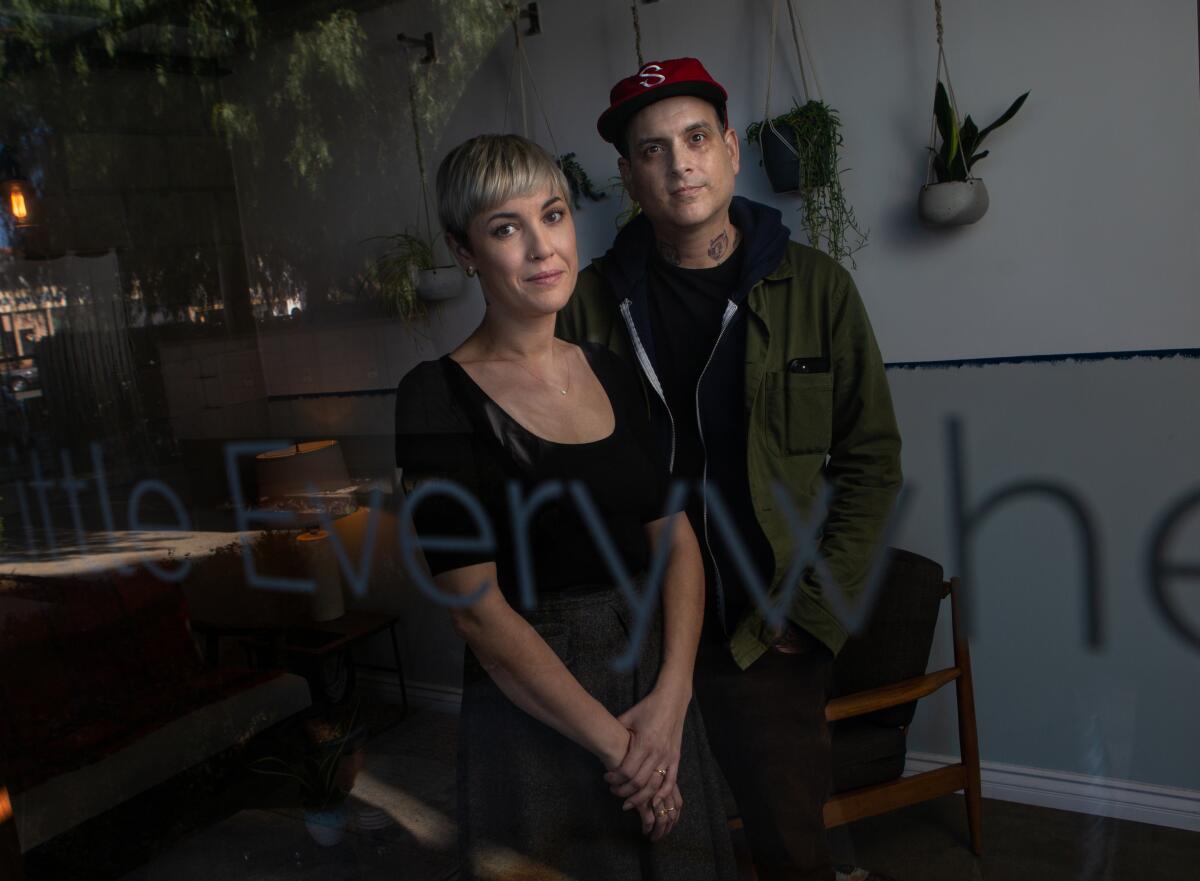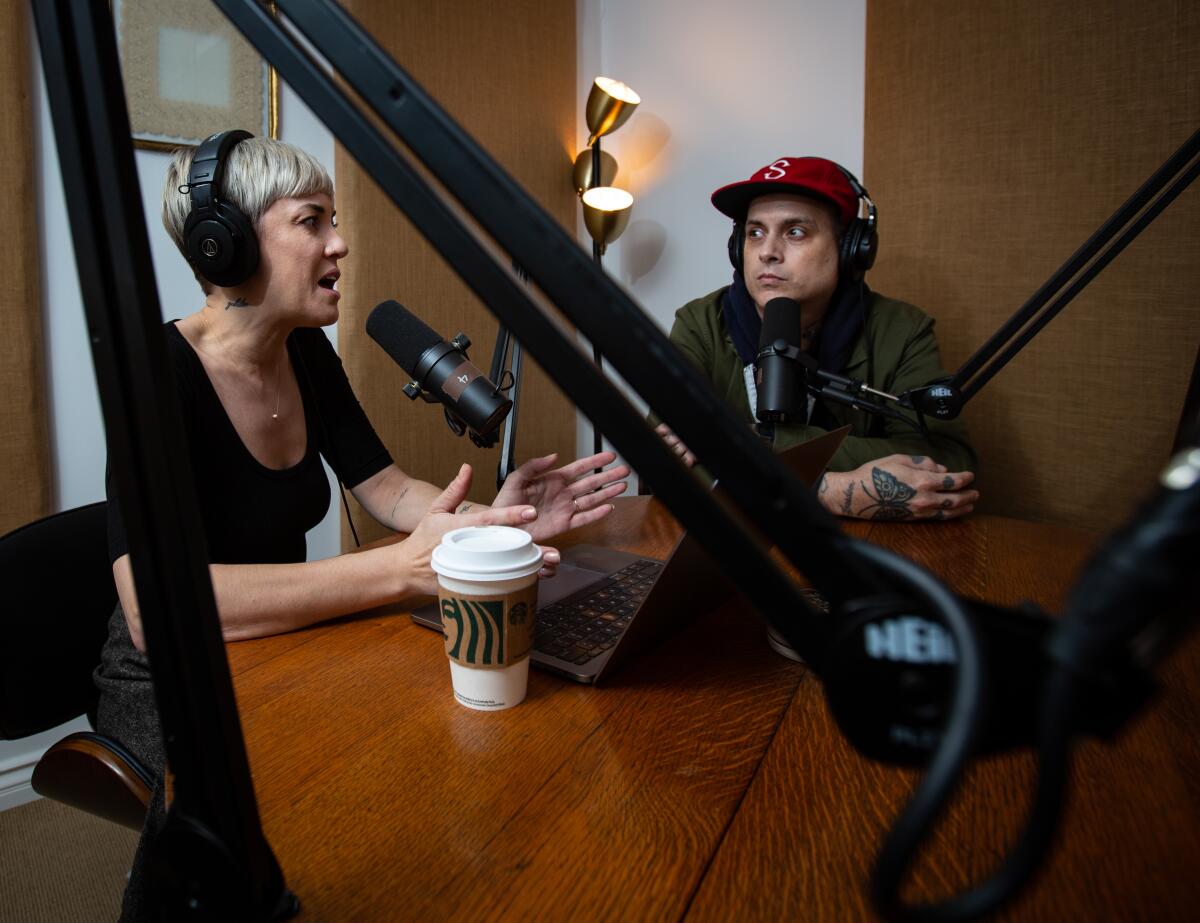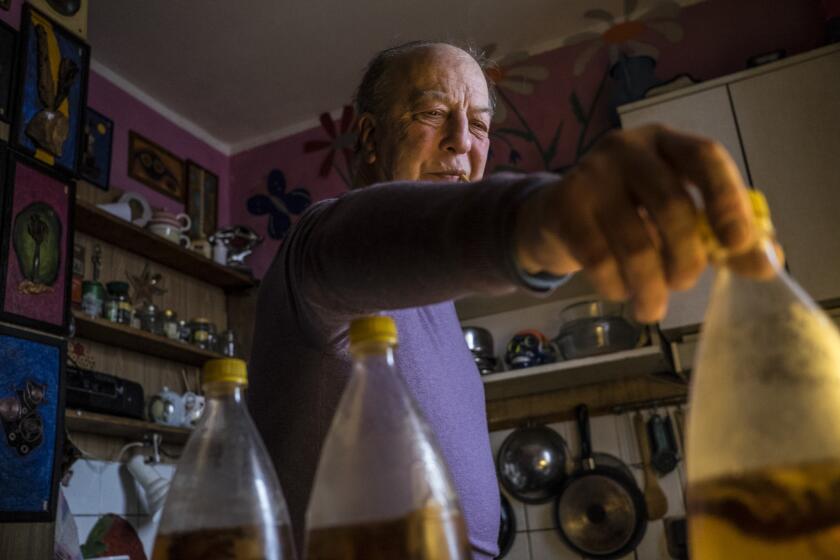Jane Marie and Dann Gallucci’s ‘The Dream’ podcast investigates the promises of a booming wellness industry

Jane Marie isn’t much of a believer in, well, anything. Sitting on a couch in the sliver of an office that her podcast production company, Little Everywhere, occupies in Glendale, the host and producer spun the conversation into the realm of philosophical despair. “I would love for the universe to mean something; that would be so rad,” she said. “If anyone can convince me that it does, please call me. I can’t wait. That’s my prayer honestly, every night: Before I die, can someone please convince me that this has any meaning whatsoever, that there is order or something at the root of it.”
She was joking. Actually, probably not, but there was a zing of humor to her commentary. Sitting across from her, Dann Gallucci — her cofounder at Little Everywhere, her creative collaborator and her boyfriend of more than three years — just chuckled. He seemed familiar with diatribes like this one.
Marie’s rants, delivered with a biting tone and in a voice reminiscent of a perpetually over-it teenager, are part of what powered her and Gallucci’s podcast, “The Dream,” to No. 1 on Apple Podcasts charts and 10 million downloads in its first season. The show took on the world of multilevel marketing companies (MLMs), those ubiquitous enterprises (you’ve likely been pitched one by a Facebook friend) that ensnare people in schemes to push products like makeup, banana-print leggings, jewelry and essential oils to their friends, families, social media networks and basically anyone they come in contact with. These operations — think LuLaRoe and doTerra, or most famously Amway and Herbalife — often turn their founders into multimillionaires and get their farther-down-the-chain representatives into thousands of dollars of debt.
“The Dream” approached this world not just with deep historical research and maddening facts but a sense of the comically absurd and occasionally well-placed righteous indignation. For those unfamiliar with the world of MLMs, Marie and Gallucci explained the hold it has over people and the deep power it has amassed in the government. For those who have seen their lives or the lives of the people they love dominated by MLMs, it gave a louder voice to their frustrations. On Tuesday, it was announced that Atria, a division of Simon & Schuster, will publish Marie’s book, “Selling the Dream,” which will go deeper into all that the first season of the podcast examined.
L.A. Times interviews and reviews on podcasting culture.
When Stitcher approached Marie and Gallucci to create the podcast (Little Everywhere had previously made shows for corporate clients like Airbnb and HBO, and Marie hosted Tinder’s dating podcast “DTR”), the proposed title was “Scams,” but after an intervention from its legal department and some creative brainstorming from Marie and Gallucci, it became “The Dream.” Though Marie grew up in the Midwest and Gallucci comes from the Pacific Northwest, their current status as residents of Los Angeles offers them a perspective on the alluring but often fleeting promises of idealistic capitalism. “California has always represented a terminus for the American Dream,” Marie said. “Come here for the Gold Rush, stay for the Golden Age.”
Marie, 41, grew up in Michigan among several generations of family members who continue to try MLMs in hopes that one will finally work for them. Her personal connection to this world gave the first season of “The Dream” an extra dimension of insight into the role MLMs play in working-class communities, particularly among women who look to them not just to supplement the family income but to provide a kind of social affirmation. “I would say Jane has many strengths,” said Gallucci, 44. “But I think one of the things that’s really special is her ability to walk that line between empathy and outrage.”

Marie and Gallucci find new ways to test that balance in the second season of “The Dream,” which launched Dec. 9 and explores the world of wellness — an umbrella term that can encompass everything from crystal healing and home births to hot yoga, meditation apps and CBD-infused anything/everything. Ophelia Yeung, a senior research fellow for the Global Wellness Institute, said the organization defines wellness as “an active pursuit of activities, lifestyles and choices that lead to a state of holistic health.” And those pursuits, according to Yeung’s most recent research for the Global Wellness Economy Monitor, have grown into a $4.5 trillion worldwide industry.
“As the show progressed last season, we started to understand that it was not just about big scams or industry-wide fraud,” said Gallucci. “It also had very much to do with aspiration and hope, industries or companies that sell that. With MLMs it’s not just, ‘Come work with us.’ It’s, ‘You’re going to be rich.’ And with wellness it offers that same kind of aspirational feeling: ‘You’re going to feel better, you’re going to be healthier, you’re going to, you know …’ ”
“‘Be more beautiful and live forever,’ ” said Marie, finishing his thought.
As workplace wellness programs have gained popularity among employers, questions about their effectiveness and drawbacks have proliferated.
Southern California has become the epicenter of the wellness industry and the soil where many of its trends take root. In some segments of Los Angeles, wellness is a common language, akin to a religion. “I don’t know if we’d be doing this season if we didn’t live in L.A. It just permeates everything,” said Gallucci. “You can’t get away from it.”
Wellness has also taken on an increasing importance in the region as entrepreneurs with varying intentions have recognized the economic opportunities in peddling their preferred method of self-care.
“Because you don’t need a lot of resources or investment to start a wellness company, it’s possible for people that are unsophisticated, that don’t know the law, to jump on the bandwagon,” said Bonnie Patten, the executive director of the consumer advocacy group Truth in Advertising. “As a result of this, while we’re seeing the intentional deception of some, we also see a lot of deception on ignorance — people who think, ‘Well, it worked for me, and I’m permitted to tell my story to sell the product.’” The group’s website lists more than 3,000 examples of deceptive marketing in supplements and other wellness products.
Marie and Gallucci considered topics including the anti-vaccination movement, the health care system and the wedding industry for their sophomore season — but under the banner of wellness, they realized, they could touch on many of the issues that interested them about those narrower subjects. They wanted to explore how certain segments of the wellness industry have survived by dint of fierce anti-regulation lobbying (the supplement industry has successfully warded off the Food and Drug Administration for decades) and to investigate the myriad products that tout unverifiable claims of results or effectiveness.
In the second episode of the new season (episode four, already available to Stitcher Premium subscribers, drops on iTunes and other podcast networks Sunday night), Marie and Gallucci take a tour of all the wellness-related businesses along a stretch of Atwater Village. After walking by a past-life regression pop-up, a tarot card-reading truck and the corner store offering alcoholic kombucha drinks, the two have a conversation interrogating their own feelings toward wellness practices. While Gallucci admits he has tons of crystals at home and is a prolific tea drinker, Marie is far more dismissive.
It turns out she has earned her skepticism the hard way, as she recounts the accident that left her with a brain injury at age 6: She fell from a staircase onto a concrete floor (she detailed that experience when she was a producer at “This American Life”) and spent her childhood coping with debilitating migraines. No treatment could mitigate her pain or ease the psychological struggle. “My fatalistic view is that something will kill all of us, and it seems self-indulgent and frankly classist and other -ists to believe that you can buy your way out of that inevitability, or meditate your way out of it, or some [stuff],” she tells Gallucci on the episode. “You can’t. You’re going to get sick and die.”
Boris Korkin still remembers the three-liter jars of a fizzy, tart drink that would sit on the windowsills of the crowded, five-room communal apartment in central Moscow where he grew up with his mother after World War II.
Nevertheless, even Little Everywhere’s office betrays the pervasive influence of contemporary wellness trends. Succulents and air plants hang from the ceiling and are nestled around Gallucci’s gold record from when he was a guitarist in Modest Mouse. Earth-tone macramé pieces decorate the wall. There’s even a small quartz crystal on Marie’s desk. “I don’t think wellness is a bad thing in the world. I mean, I indulge, I go get massages,” said Marie. “[But] I think there’s magical thinking that can then lead to people being taken advantage of, and that’s where we want to look.”
“The judgment around the wellness industry — it’s not just about making yourself or your group or your friend group feel better or whatever,” Gallucci said. “It’s about creating this idea that this is the only way to feel better. So if people are doing other things or specifically not feeling what you’re doing, then there’s something wrong with that lifestyle.”
Marie has arrived at her own take on wellness: It’s whatever you want it to be or whatever you need to get through this life. For her, that mostly involves Taco Bell, but that doesn’t mean she hasn’t felt compelled to test other methods. This season’s third episode opens with her revealing a nightmare: She’s at an Arby’s drive-through, but the microphone at the order window doesn’t work and other cars and customers are piling up behind her. It’s hilarious, but Marie offers it up as an example of how much the concept of wellness and the need to sample the latest powders and practices have entered even her nihilistic psyche. Later in the episode, she ends up spending over $200 at the Moon Juice in Silver Lake.
“All of this is about control and managing anxiety — the whole wellness industry,” she said. “It’s about existential dread, a hundred percent.”
More to Read
The biggest entertainment stories
Get our big stories about Hollywood, film, television, music, arts, culture and more right in your inbox as soon as they publish.
You may occasionally receive promotional content from the Los Angeles Times.











